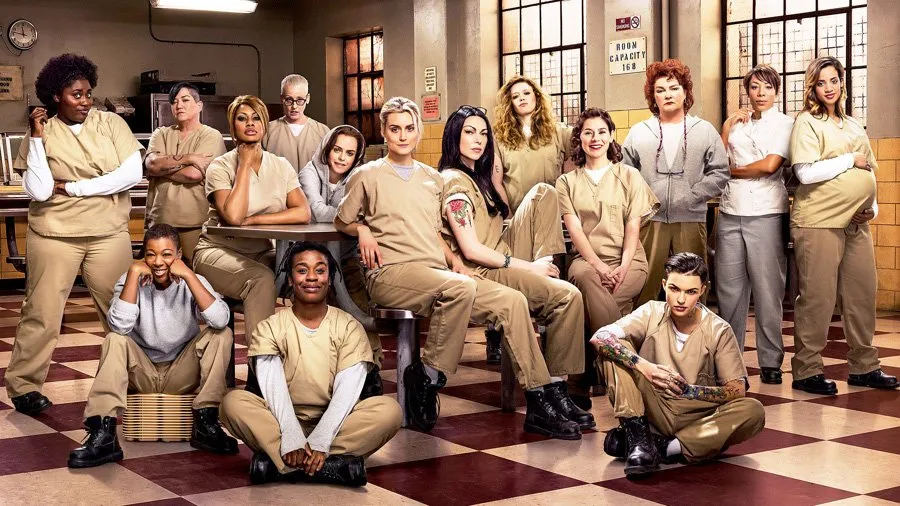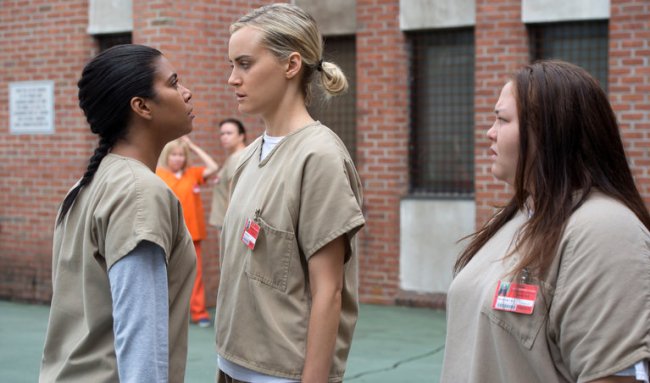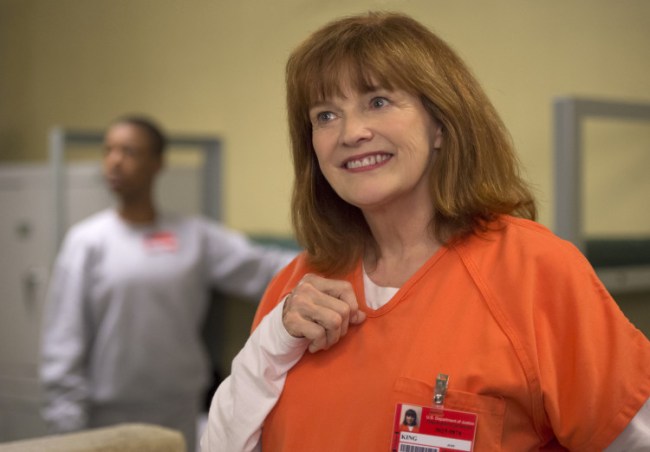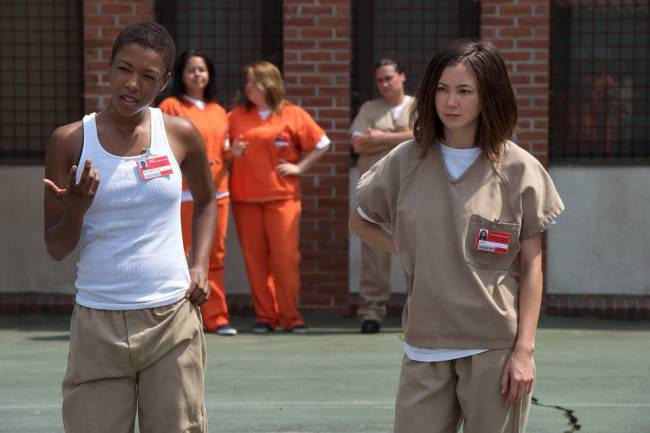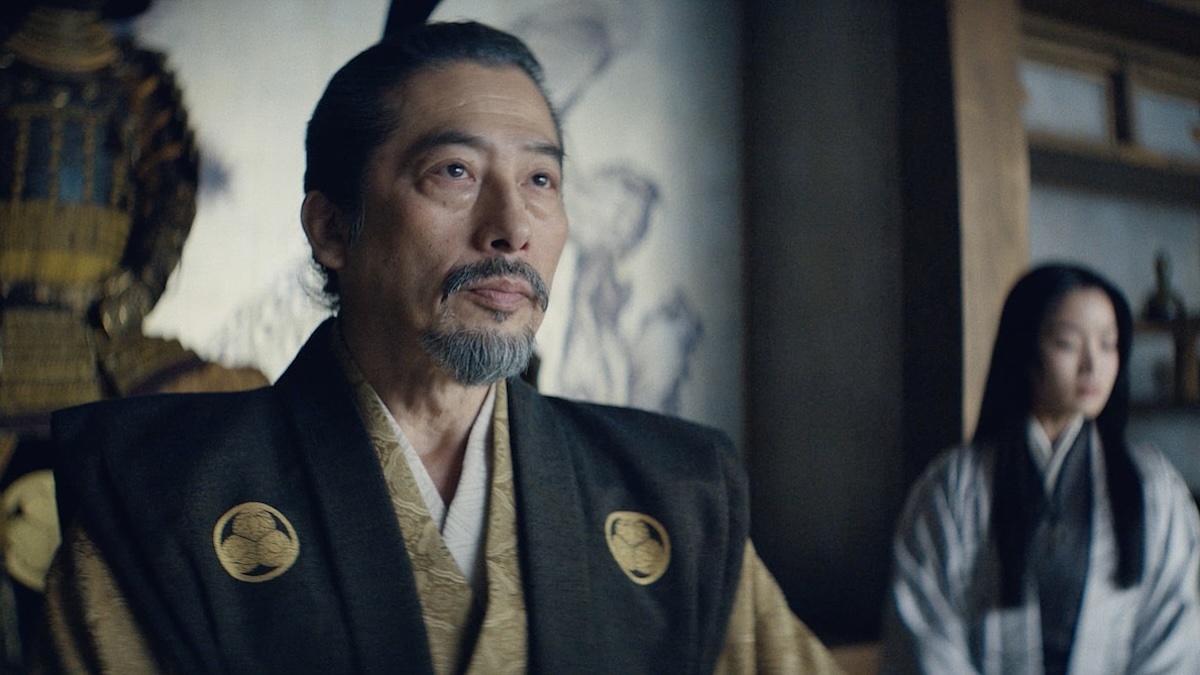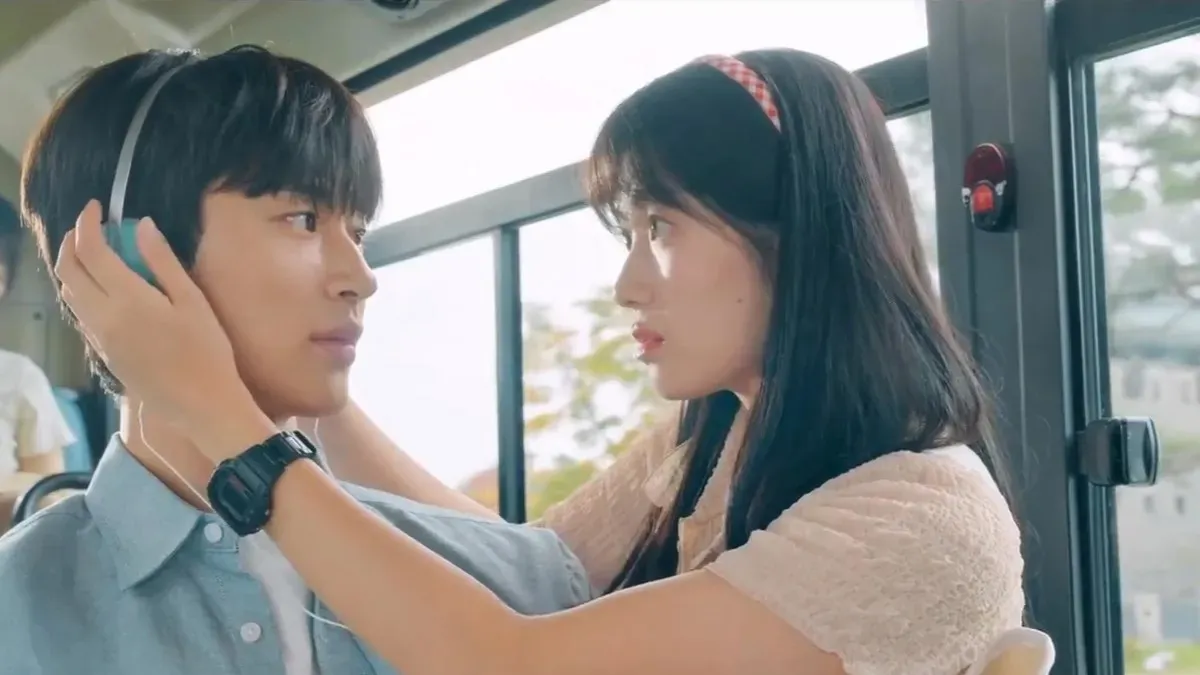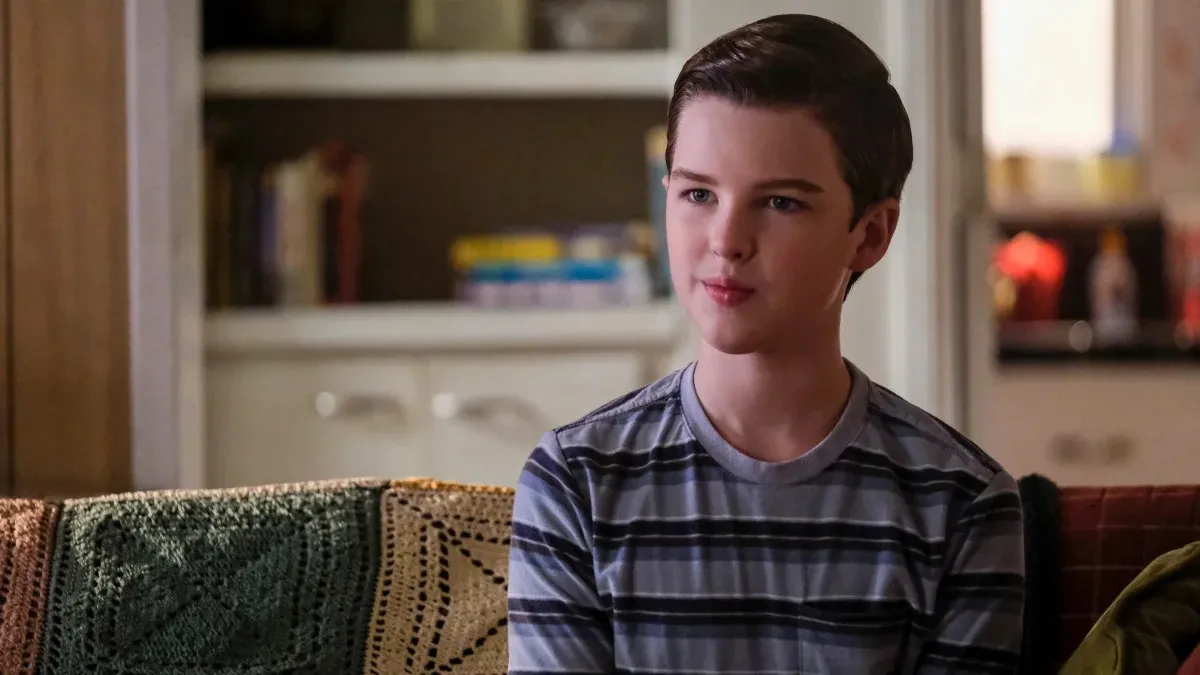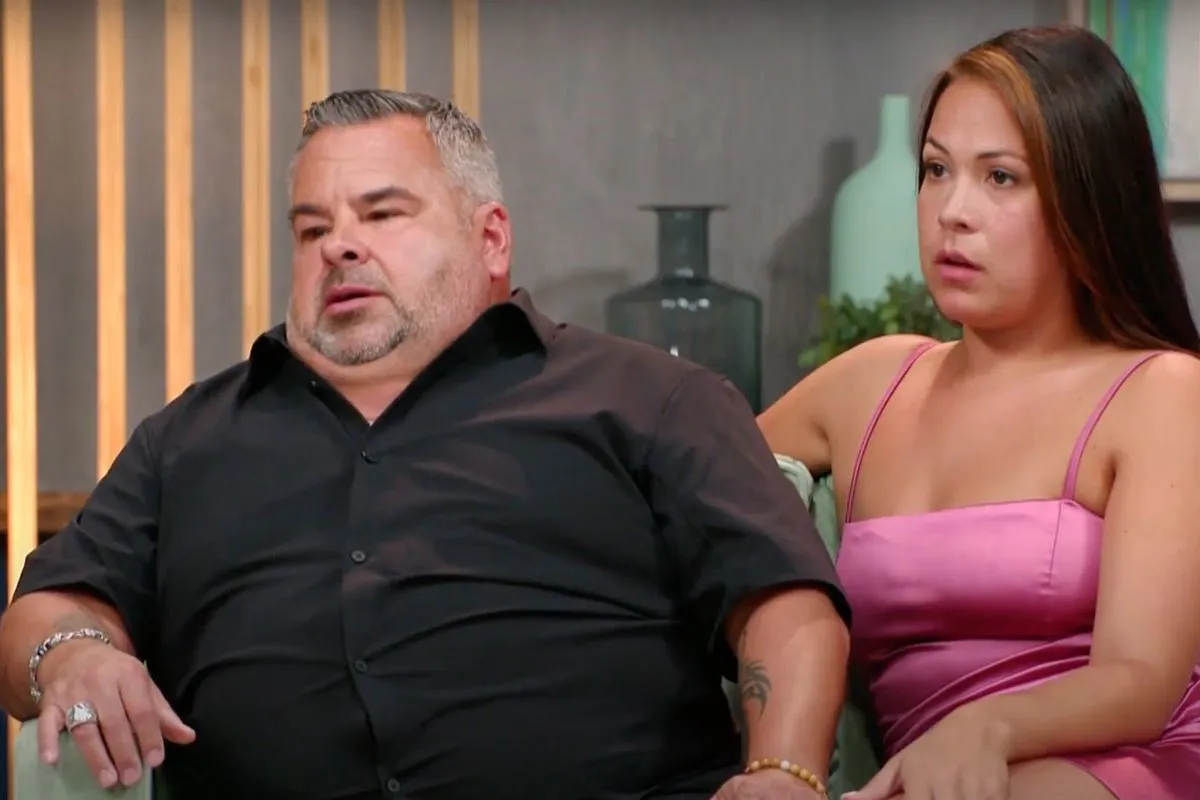Netflix’s Orange is the New Black has always been a bastion of diversity. It’s a mostly female, multi-ethnic, multi-racial cast that includes people of many different sexualities and gender expressions. However, in its most recent season, the show’s fourth, it looks at issues of privilege more powerfully than it ever has before. Racism, sexism, ableism, and classism are explored within the system keeping the women of Litchfield imprisoned, and among the women themselves.
**SPOILERS GALORE**
Season 4 of Orange is the New Black is its most substantive yet, which also makes it the most emotionally draining season of the show. It hits real-world issues hard, and as we see the effects of the prison industrial complex on both the prisoners and the guards on the show, we can see how important it is for social justice work to be intersectional.
A couple of days ago, I wrote a post about how Orange is the New Black explores these difficult issues by depicting how the system marginalizes and abuses the inmates (particularly the women of color) in their custody. Today, I wanted to discuss how the show explores the intersectionality by exploring the interactions between the inmates.
Let’s start with the problematic Piper, who’s always been the poster child for White Feminism and White Privilege and who also has class privilege. She represents a very specific, and ultimately dangerous, kind of white woman. It would be easy to look at her and, giving her the benefit of the doubt, call her cluelessly well-intentioned–the kind of white person who tries to be aware, but more often than not has no idea how her privilege operates. However, in the current season of OITNB, we see that Piper not only knows how her privilege operates, but is consciously willing to use it and manipulate it for her own gain, regardless of whom it hurts.
At the top of S4, after Piper has sent Stella to max, seeing her walk around with her chest puffed out like she’s a Bad MF is hilarious, because it’s so preposterous, but when she says that she’s “gangsta, with an ‘a’,” that is downright cringe-inducing. The season has only just begun, and she’s already appropriating.
However, it’s the conflict with Maria and the rest of the Latinas over “business” in the prison that really allows us to see Piper’s true colors. As I mentioned in yesterday’s piece, Piper goes to Piscatella to report that “women of a certain noble heritage” are “gathering” in “clusters,” knowing full well that Piscatella would take the word of a nice-looking white woman seriously, and assume the worst of the Latinas.
Her reportage to Piscatella not only inspires him to have her lead an “Anti-Gang Task Force” of fellow inmates where she is given permission to watch and report on Latina activity (and the other inmates of color, too, but the Latinas are the main goal in that moment), but it inspires an increased profiling of Latina prisoners by the COs, who take this as an opportunity feel up the women during “random” searches, and wield their power a bit more firmly with them (Flores being made to stand on a table, Maritza being forced to eat a baby mouse), because they know the women know that they’re even more powerless now than they had already been before.
Piper is also directly responsible for more years being added on Maria’s sentence, which is heartbreaking considering she has a young daughter on the outside whose childhood she’s missing. And by heartbreaking, I mean that it makes Maria want to kill Piper.

Since the prison is segregated, both officially and unofficially, into racial designations like “The Suburbs,” “The Ghetto,” “Spanish Harlem,” etc, each group tends to hang out among themselves by default. So, Piper ends up going to fellow white women to join the task force. When a new inmate, Kasey Sankey, asks what the group is all about, Piper tells her and invites her to a meeting. However, by the end of that meeting Piper realizes she started something she didn’t intend. She started a White Power movement among the white inmates, one that Sankey eventually leads.
Piper must eventually deal with being branded with a swastika by Maria and her crew, but by then we already see the full picture. Neither Piper, nor any of the other white prisoners, will never be as scrutinized or as victimizes as the women of color.
What’s interesting, is that of all the White Supremacists, it is their ringleader Sankey who begins to soften first regarding her vehemently racist stance on other inmates. She refuses to fight Suzanne at Humphrey’s insistence, which allows Kukudio to step in. She reins in her people from starting a fight with the black inmates after Poussey’s death, reminding them that Poussey’s friends are in mourning. This doesn’t mean she’s reformed, but it does mean that she’s capable of slightly more critical thought than the others. Interesting, too, is that the White Power Movement, while the most obvious in their racist views, are also the least dangerous at the prison. As they are vastly outnumbered, they are in a constant state of planning and anemically hurling racist insults. We’ve seen a lot of casual racism from characters like Morrelli, Pennsatucky, or meth-heads Angie and Leanne, but what this show demonstrates is that it’s the Pipers of the world — who not only know about their privilege, but have the education to weaponize it — that do the greatest amount of damage.
While Piper comes from a comfortable background, the intersections between race and class are more thoroughly explored through new celebrity inmate, Judy King, who is a sort of Martha Stewart figure. Right away, because of her celebrity status, MCC wants to make sure she is kept happy out of concern for what she’ll say about her experience when she’s eventually released. So, she is given a private room with a white roommate (Yoga Jones), and basically has access to any comforts she requests. She is a nice person, but as is true with Piper, that “niceness” is superficial and masks a deeper misunderstanding about her relationship with the non-white women at the prison.
At first, she seems to start befriending everyone. She has an open, friendly demeanor and because of her privileged position has the luxury of treating prison almost like a summer camp. It’s all a big slumber party as she requests items for her room, and flits from table to table in the cafeteria striking up conversations. When she realizes that Black Cindy, Abdullah, and Taystee are trying to take a picture of her to send to a tabloid for money, rather than feel upset or used, she kisses Black Cindy and allows it to be photographed.
Her relationship with Poussey, who idolizes her and took forever to even talk to her because she was so nervous, is especially poignant. Eventually, the two become friendly, and Poussey begins to assist her during the cooking class King was mandated to teach by the ever-misogynistic and controlling Healy. On the last episode of Season 4, King agrees to hire Poussey when she gets out, giving her her private number and telling her to call.
However, there’s also the matter of the racist children’s puppet show she hosted early in her career, clips of which have become viral on YouTube and eventually make the news, Paula Deen-style. King’s new black “friends” start to think less of her, and rightfully so.
In a scene with Poussey in the library in Episode 8 she, like many white people have before her, goes to one of the only black people she’s ever known in her life and asks her to educate her on why they can’t all “just get along.” King asks her to talk to “her friends” because she thinks they’re after her. Poussey calls her on the fact that it’s racist for her to think the black inmates are following her around because they want to jump her over her children’s show (they are following her trying to take her picture), and while King acknowledges that she “might” be racist, she insists that she’s “the friendliest racist you’re ever gonna meet” and, placing her loneliness above the needs of her “friends,” she continues to ask for Poussey to intervene on her behalf, which Poussey begrudgingly agrees to do.
King, like Piper, is another mirror through which white women can look at themselves and check for similarities. Similarities they might not want to acknowledge, but should study nonetheless. She actually acts as a mirror to Yoga Jones who, up until this point has seemed like the most welcoming, equality-minded people ever. As she spends time as King’s roommate, however, she has to confront the fact that she’s racist and classist herself, despite her hippie beliefs and the socially-conscious mask she wears.
The thing about intersectionality is that it’s something that concerns all of us. Yes, even non-white people. One of my favorite parts of this season was the fact that it didn’t let people of color off the hook for their own bigotries and playing their privilege against others. Here are some examples of that:
Brook Soso – this half Japanese, half-Scottish inmate’s relationship with Poussey was one of the sweetest elements of OITNB Season Four. However, it got significantly less sweet toward the end, when in an attempt to bring Poussey closer to her idol, Judy King, she voices her assumptions that Poussey has had a “hard life” and that her mother must have been on drugs. She knew absolutely nothing about Poussey’s life, and foolishly thought herself an activist, only to reveal that she held racist beliefs about her own girlfriend.
Latinas in the Salon – this season, the Latinas were running their business out of the prison salon that had once been Sophia’s domain. They were able to take it over after Aleida started making inflammatory, transphobic comments about Sophia, causing her to be targeted by the Latina inmates. It’s this targeting that ultimately gets Sophia sent to the SHU for her “protection,” and the Latinas take over the salon. Cis privilege at its “finest.”
Tovah and Abdullah – by far the strangest rivalry during Season 4, Black Cindy (who converted to Judaism for the food) and Abdullah (a Muslim who seems that way in name only) have their own “Mid East Conflict” while fighting over their bunk space. They eventually quash their beef and bond over their shared morbid fascination with Scientology, but this story-line reminds us that even among fellow marginalized ethnic or religious groups, fights for dominance occur. If only they’d spend less time fighting each other and more time looking up at their real enemy: a world that pits them against each other in support of interests that have nothing to do with either group. That’s something we can learn from this otherwise absurd and heavy-handed “conflict.”
Everyone v. Asians – On such a diverse show, the fact that there are only (now) three Asian characters is bananas. Even more bananas is how flippantly every other group on the show, no matter their race or ethnicity, manages to slight Asian people on a regular basis. Soso, Chang, and new Hawaiian inmate Stephanie Hapakuka are repeatedly fetishized, belittled, or marginalized. This post over at Hyphen points out that:
“This isn’t to say that race- or gender-based jokes are, or should be, off-limits for OITNB, because they aren’t. Lorna Morello (Yael Stone) makes a rude joke to transgender inmate Sophia (Laverne Cox), calling her a “lady-man.” But instead of letting it slide, Sophia calls Morello out on the slur and stands up for herself and the population she implicitly represents. The Asian characters don’t have that same opportunity, to confront racist jokes as they happen, and instead are relegated to either putting up with it or not even knowing it’s happening, which is a much more insidious fate.”
Orange is the New Black is not a perfect show (and it certainly doesn’t lack problematic elements, starting with the fact that they have zero black people on their writing staff), but it is a show that allows us to wrestle with the important, intersecting issues surrounding race, gender, class, and ability. It gives all of us the opportunity to confront our privilege and a vehicle through which to talk about it. It does what all good art should do. It forces us to confront ourselves and our beliefs in the real world, and gives us a way to communicate about those beliefs with others.
Want more stories like this? Become a subscriber and support the site!
—The Mary Sue has a strict comment policy that forbids, but is not limited to, personal insults toward anyone, hate speech, and trolling.—
Follow The Mary Sue on Twitter, Facebook, Tumblr, Pinterest, & Google+.



